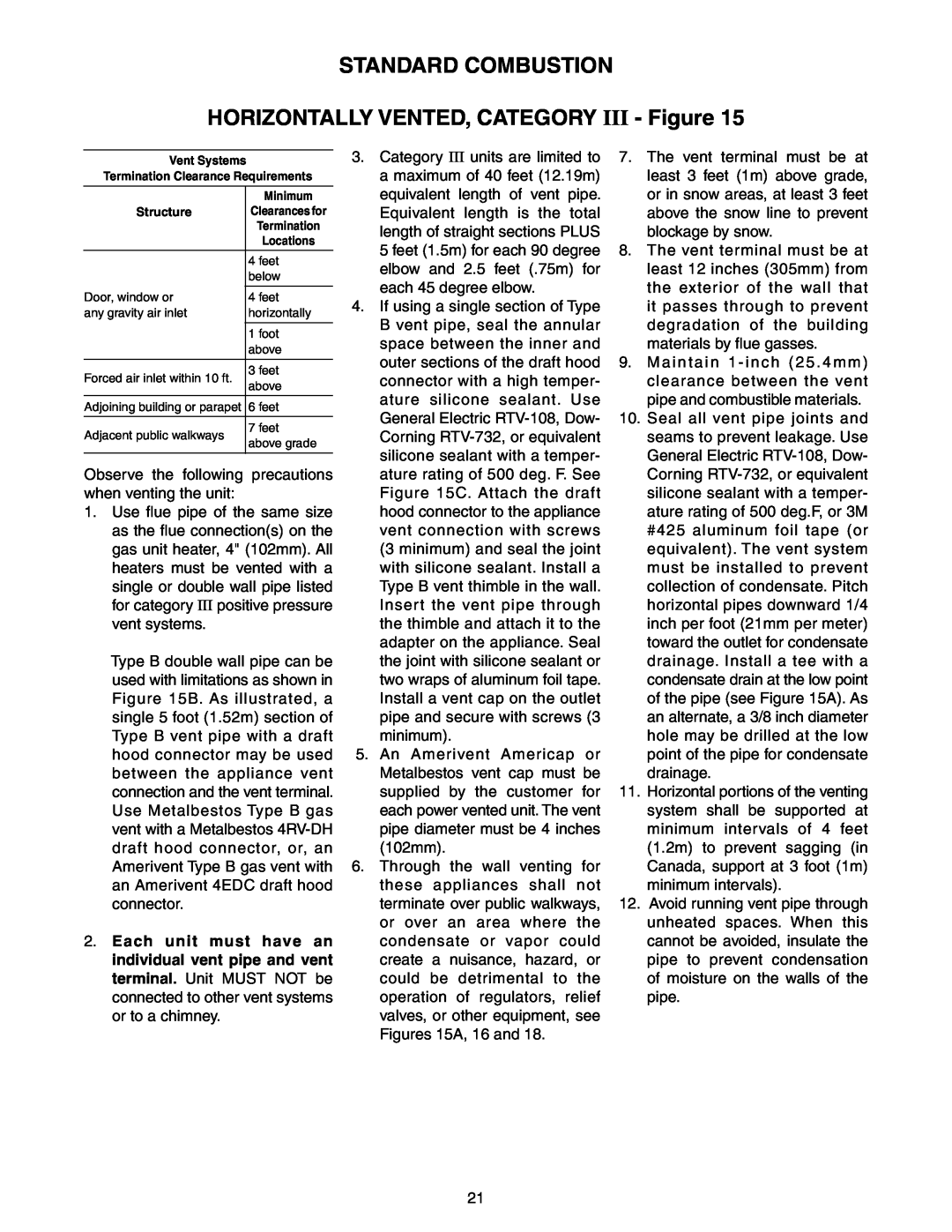STANDARD COMBUSTION
HORIZONTALLY VENTED, CATEGORY III - Figure 15
Vent Systems
Termination Clearance Requirements
|
| Minimum | |
Structure | Clearances for | ||
|
| Termination | |
|
| Locations | |
|
|
| |
|
| 4 feet | |
|
| below | |
|
|
| |
Door, window or | 4 feet | ||
any gravity air inlet | horizontally | ||
|
|
| |
|
| 1 foot | |
|
| above | |
|
|
| |
Forced air inlet within 10 ft. | 3 feet | ||
above | |||
|
| ||
|
| ||
Adjoining building or parapet | 6 feet | ||
|
|
| |
Adjacent public walkways | 7 feet | ||
above grade | |||
|
| ||
|
|
| |
Observe the following precautions when venting the unit:
1.Use flue pipe of the same size as the flue connection(s) on the gas unit heater, 4" (102mm). All heaters must be vented with a single or double wall pipe listed for category III positive pressure vent systems.
Type B double wall pipe can be used with limitations as shown in Figure 15B. As illustrated, a single 5 foot (1.52m) section of Type B vent pipe with a draft hood connector may be used between the appliance vent connection and the vent terminal. Use Metalbestos Type B gas vent with a Metalbestos
2.Each unit must have an individual vent pipe and vent terminal. Unit MUST NOT be connected to other vent systems or to a chimney.
3.Category III units are limited to a maximum of 40 feet (12.19m) equivalent length of vent pipe. Equivalent length is the total length of straight sections PLUS 5 feet (1.5m) for each 90 degree elbow and 2.5 feet (.75m) for each 45 degree elbow.
4.If using a single section of Type B vent pipe, seal the annular space between the inner and outer sections of the draft hood connector with a high temper- ature silicone sealant. Use General Electric
5.An Amerivent Americap or Metalbestos vent cap must be supplied by the customer for
each power vented unit. The vent pipe diameter must be 4 inches (102mm).
6.Through the wall venting for these appliances shall not terminate over public walkways, or over an area where the condensate or vapor could create a nuisance, hazard, or could be detrimental to the operation of regulators, relief valves, or other equipment, see Figures 15A, 16 and 18.
7.The vent terminal must be at least 3 feet (1m) above grade, or in snow areas, at least 3 feet above the snow line to prevent blockage by snow.
8.The vent terminal must be at least 12 inches (305mm) from the exterior of the wall that it passes through to prevent degradation of the building materials by flue gasses.
9.Maintain 1 - inch (25 . 4mm) clearance between the vent pipe and combustible materials.
10.Seal all vent pipe joints and seams to prevent leakage. Use General Electric
11.Horizontal portions of the venting system shall be supported at minimum intervals of 4 feet (1.2m) to prevent sagging (in Canada, support at 3 foot (1m) minimum intervals).
12.Avoid running vent pipe through unheated spaces. When this cannot be avoided, insulate the pipe to prevent condensation of moisture on the walls of the pipe.
21
